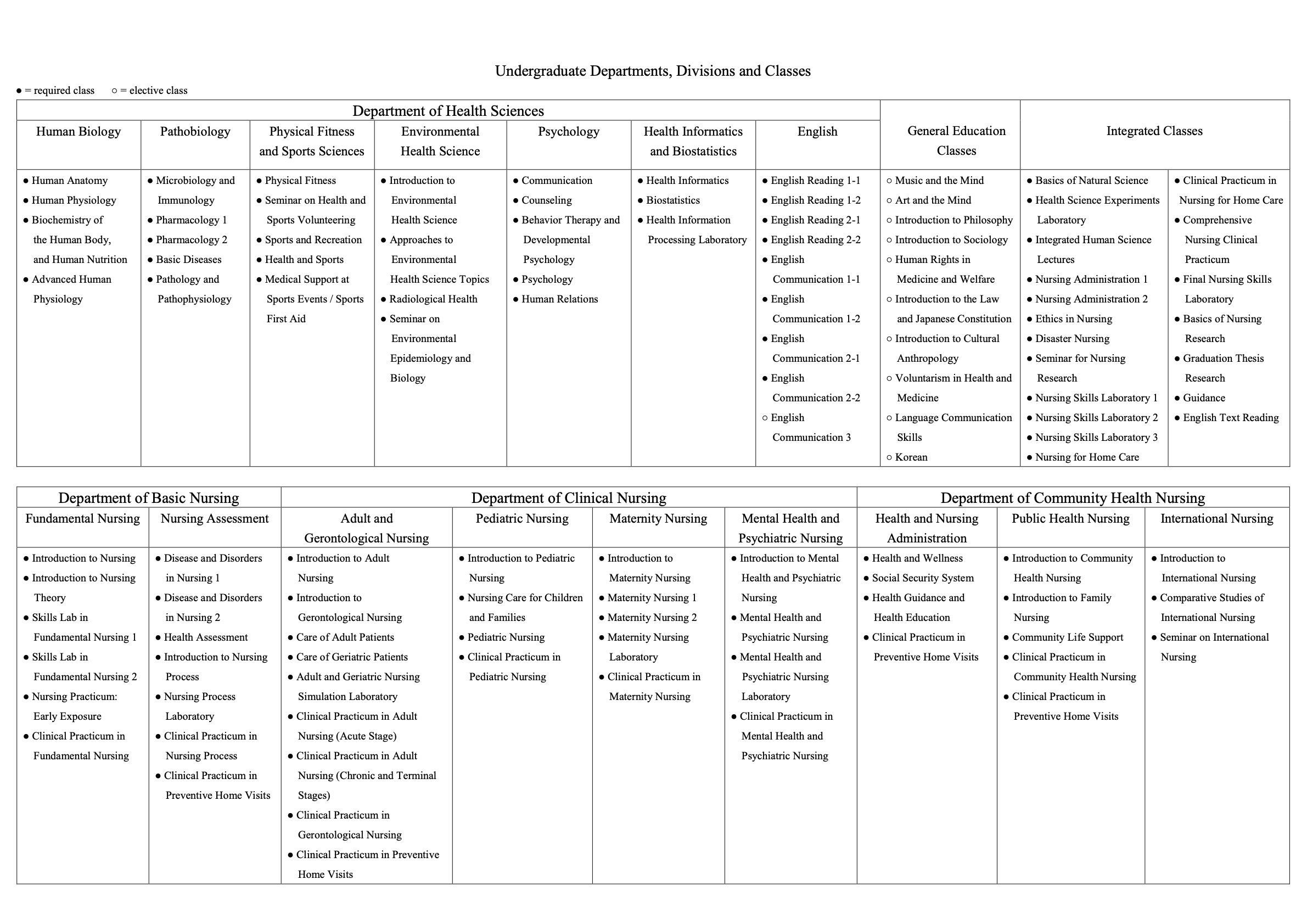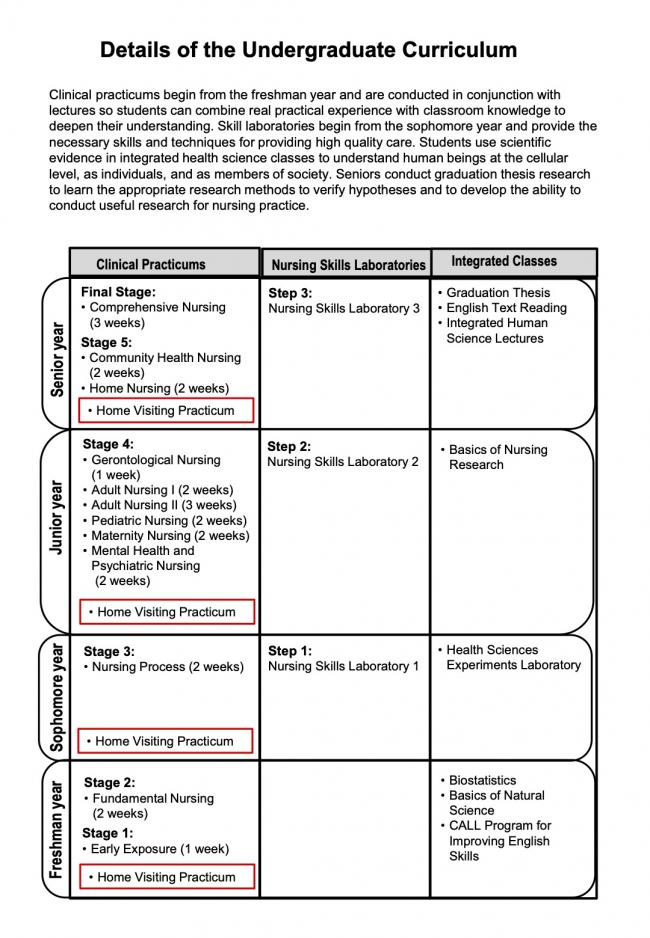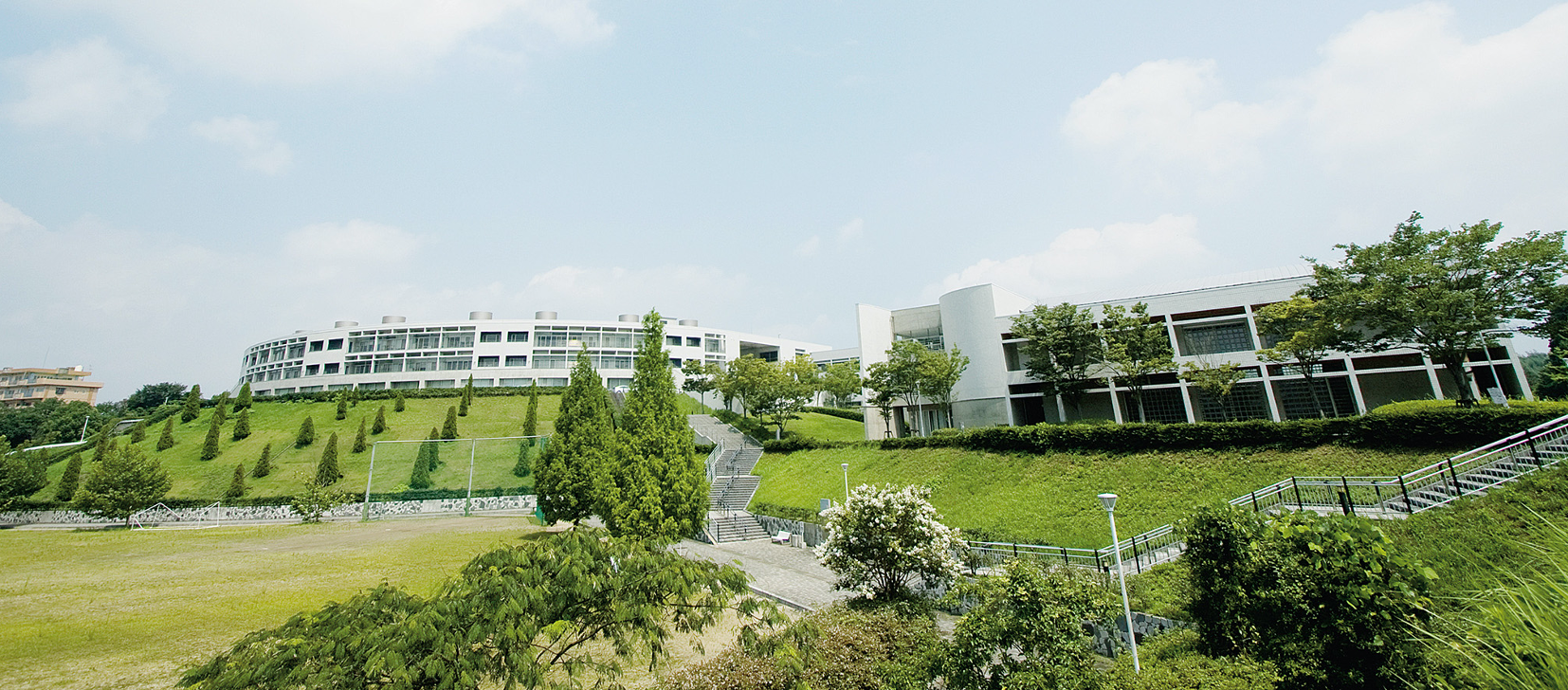Undergraduate School Overview
Undergraduate Education at OUNHS
OUNHS was one of the first institutions in Japan to offer parallel instruction in both nursing science and general education in all four years of its curriculum. Nursing subjects are closely integrated with basic health and human sciences, and classes in these areas are heavily offered in the freshman and sophomore years as a broad foundation for the study of nursing.
The Department of Health Sciences offers classes in the behavioral, biological, and environmental sciences, and in informatics, computer science, psychology, foreign languages, and physical education.
The Departments of Basic Nursing, Clinical Nursing, and Community Health Nursing offer instruction in the fundamentals, specialty area practice, and wider communal and international applications of nursing. The curriculum balances rigorous academic learning with varied and intensive clinical experiences to provide competency and proficiency in clinical skills, patient care management, critical thinking, and decision making. OUNHS was also the first in Japan to establish international nursing as an integral part of its curriculum, and the first to make nursing assessment into an independent area of research and instruction.
In 2011, a full four-year registered nursing undergraduate curriculum was introduced by OUNHS, making it the first school in Japan to concentrate exclusively on registered nursing education in all four undergraduate years. This curriculum is more meaningful because it features an increased emphasis on practical nursing for students. Our curriculum develops nurses with the perceptional capacity and practical ability to provide high levels of care for a wide range of medical and health needs.
The curriculum emphasizes: 1) increasing perceptional capacity and technical abilities; 2) improving proficiency in anatomy, physiology, pathology, pharmacology and microbiology; 3) facilitating learning abilities through self-study; 4) reinforcing anatomical physiology, clinical pathology and clinical pharmacology; and 5) reinforcing hands-on practice in specialty fields through seminars with a comprehensive approach to nursing.
In 2015, OUNHS established a preventive home visiting practicum to older adults residing near our campus to familiarize students with their health promotion and preventive care needs, and an undergraduate elective course for training specially-qualified school health nurses in charge of the health care and health education of school children.


The Preventive Home Visiting Practicum
In a super-aged society such as Japan, community-based integrated care systems need to be established so older adults can keep their own way of living at home in their final days. These systems demand that nurses offer support to prevent daily living dysfunction, hospitalization, and institutionalization. However, much current nursing education occurs in hospitals and other institutions, and students have limited opportunities to observe and care for community-dwelling older adults who are not in need of visiting nursing care.
In 2013, OUNHS established a new preventive home visiting practicum to the older adults residing near our school to develop community-oriented geriatric and community health nursing competencies among all our undergraduates.
In the practicum, students are grouped in teams of four (a freshman, sophomore, junior and senior) with two faculty members in support. Each team regularly visits their client, local volunteers aged 70 or older, to talk about lifestyle and health, and to provide advice and solutions in collaboration with health and welfare professionals, although medical treatment or clinical care is not provided in the visits. Every year graduating seniors are replaced by new freshmen, who are mentored by their new group members. Issues found through the visits are shared as regional challenges among stakeholders such as local governments and public health nurses.
Visiting students acquire multiple perspectives for understanding older adults, including a variety of individual and environmental aspects of wellness, prevention, and community life. They also learn the importance of team practice through collaboration. The practicum learning contents are useful for future nursing education focused on older adults and for facilitating critical changes in nursing education to address the problems of our aged society.
School Health Nurse Training Course
School health nurses in Japan are specially licensed educators who support the growth and development of children through health education and health services based on principles of health promotion. They provide first aid; health instruction; physical and mental care; planning of school health programs; and managing and operating health rooms in elementary, junior and senior high schools. They also accept, encourage and counsel truants and students with various anxieties. In 2015 OUNHS established a four-year school health nurse training course accepting ten students per academic year. These students are also enrolled in the main undergraduate nursing curriculum and are eligible to take both the national nursing licensure examination and the national school health nurse licensure examination after graduation.

